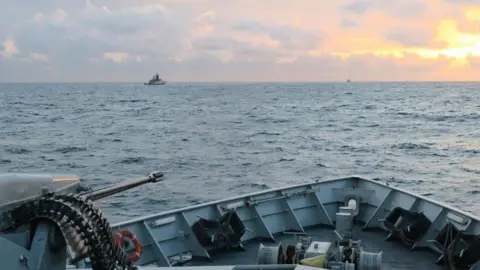**Navy Intercepts Two Russian Ships in English Channel**
In a notable incident reported by the UK Ministry of Defence, two Russian warships were intercepted in the English Channel by the Royal Navy. This event reflects the ongoing tensions and maritime security concerns related to Russian naval activities, particularly as Russian vessels continue to test the waters in close proximity to the United Kingdom.
The intercepted vessels included the RFN Stoikiy, a corvette, and Yelnya, a fuel tanker, both of which were observed sailing west through the Dover Strait into the English Channel. The interception was executed by HMS Severn, an offshore patrol vessel, over the past fortnight. This event marks yet another occurrence of Russian naval activity within UK waters, amplifying concerns regarding maritime security and territorial integrity.
In the weeks leading up to this interception, further provocations were noted, including the presence of the Russian spy ship Yantar off the Scottish coast. Reports suggested that Yantar had deployed lasers in an attempt to disrupt reconnaissance flights by the Royal Air Force (RAF) tracking its movements, an action condemned by Defence Secretary John Healey, who labeled it as “deeply dangerous.” Healey made it clear that the UK military is vigilant, asserting, “We see you. We know what you’re doing. We are ready.”
Healey has also pointed out a significant increase in Russian naval activity, highlighting a 30% rise in Russian vessels infringing upon or threatening UK territorial waters over the past two years. This amplified presence of foreign naval assets has raised alarms within the UK government regarding potential aggression from Russia, which extends beyond maritime matters and impacts European security as a whole.
After the interception of the Stoikiy and Yelnya, HMS Severn passed the responsibility of monitoring the situation to a NATO ally stationed off the coast of Brittany. However, the UK vessel continued to maintain a watchful eye, ready to respond to any unforeseen developments. This cooperation among NATO allies illustrates the importance of joint security efforts in the face of fluctuating threats.
The RFN Stoikiy is not unfamiliar with British territorial waters, as it had previously been shadowed by the Royal Navy earlier this year. During that incident, two Royal Navy vessels and the 814 Naval Air Squadron, often referred to as the “flying tigers,” tracked the Russian warship as it moved towards the Mediterranean, finalizing its journey back to the Baltic Sea alongside two merchant vessels. Such steps taken by the Royal Navy are vital in demonstrating the UK’s commitment to safeguarding its maritime boundaries.
John Healey reiterated that these occurrences of Russian naval activity are indicative of a broader trend of “Russian aggression” that poses a threat to stability not only within UK coastal waters but across Europe. This ongoing situation requires vigilance and readiness to counter any maneuvers that could escalate into more serious confrontations.
HMS Severn, which has been operational since 2002, is a River-class offshore patrol vessel. This class of ship, which includes HMS Tyne and HMS Mersey, is designed for various mission profiles, including the escorting of foreign warships, conducting fishing vessel inspections, and ultimately defending the UK coastline.
The recent events not only underscore the necessity for robust naval presence and readiness in the face of potential threats but also highlight the increasingly complex dynamics in European maritime security. As tensions remain high, the Royal Navy continues to stand guard, embodying the UK’s commitment to maritime security and international cooperation in navigation.











